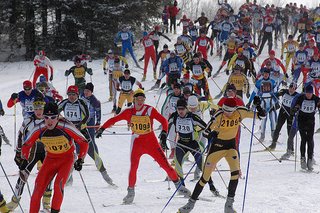
O Mighty Crisis
Let me tell you the tale of an old college acquaintance--let's call him Joe-O. Now Joe-O is a character in and of himself; he's strident about leaving the smallest "footprint" he can on the planet, to the point that he only buys in bulk, composts everything, and, if he does create some small amount of garbage, he just burns it every few weeks. When he lived 30 miles from his job, that was not enough to make him drive a car...instead, he viewed the 60-mile daily bicycle commute as an opportunity for fitness. In addition to biking, Joe-O is a fan of all silent sports, cross-country skiing, in particular. For more than a decade now, he's been into ski racing, with his season capped off by racing the American Birkebeiner, held in the Cable/Hayward, Wisconsin, area every February.
Many of you are doubtlessly acquainted with the Birkie, and some of you may have skiied it yourselves. You would then know that upwards of 10,000 skiers participate, and because of the heaps of steaming humanity standing on slippery pointed boards with sharp sticks in their hands, the race start takes place in "waves." That means that it's not a mass start, but rather large groups (each one a wave) begin the race in staggered fashion, every few minutes. The waves are also seeded, which means that the elite American and international skiers are put into the First Wave, and then successive waves are populated by skiers who have achieved certain times in previous races. The sum effect of these waves is that the best skiers start first, the next best skiers start second, and so on, all the way back to the final wave, which is populated by 85-year-old-retired pastors, 8-year-old Boy Scouts, and women in labor.
For old Joe-O, the first year he entered the Birkie, he had no race record and, therefore, was seeded in the last wave. This was a bit frustrating to Joe-O because he had proven himself to be a gifted skier, but he knew he had to rack up a tremendous race time this first year, in order to improve his start position for the following year. With skill and strategy, he knew he would, with a good race, be starting in one of the first few waves in successive years.
So he took his place on the course, having been up late the night before waxing his skis perfectly for the conditions, and now he was primed, waiting for the starting gun, the Eye of the Tiger glinting in his gaze.
And then.
And.
Then.
He, well...He...how shall I say it discreetly? He felt a sudden, undeniable, overwhelming need to void his intestinal regions.And, naturally, with 9,999 other jittery and nervous racers feeling the same way, the line at the port-a-johns was not short. Suffice it to say, by the time Joe-O got back to the start line, his wave--the last wave--had already started. He could still begin the race, but his shot at a stellar time, one that would move him up in future years, had gone down the drain with his intestinal evacuation.
Here is the crux of my story, so stop slouching and pay attention: Joe-O took a moment to huff and stomp and mutter, and then he regrouped and came up with Plan B (this moment is also known as acceptance that Some Things Cannot Be Changed). His plan was this: since he was going to be the caboose in this train of 10,000 skiers, he would make the most of it--the sheer amount of detritus left behind by all those participants could be a windfall for Joe-O. He would, quite simply, forget about racing and, instead, pick up every discarded item he could find along the course: water bottles, ski poles, hats, mittens, fanny packs, and the like. Why, he'd never have to buy another cheap pair of UV-blocking sunglasses again, after this day! He'd never again have to invest in safety pins, or fleece neck gaiters, or half-eaten bags of gummy bears!
Hours later, after covering the 50K course as a lurching stop-and-start scavenger, Joe-O crossed the finish line; his one-piece lycra racing suit had been transformed into a bulging crap-carrier. Early on, he'd realized he couldn't carry all the loot in his hands, so he'd unzipped the front of his suit and started stuffing in every wayward item he encountered, until, at the end, he looked like a red Michelin Man staggering away from a particularly fruitful rummage sale (one that didn't happen to have any bags for customers).
What do we learn from Joe-O and his "let's make espresso out of chicory" approach to the race? First, it ain't over 'til it's over, so continue to hang in there until the bloody, or junk-filled, end. Second, even if the race isn't shaping up as you'd hoped, with the right attitude, you can reap unexpected rewards. Third, don't shove a broken sharp metal ski pole tip so far down into your ski suit that you nearly become a soprano (or, more correctly, a castrato).
No comments:
Post a Comment